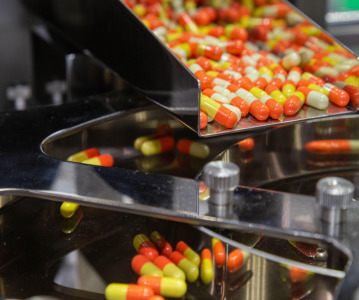Biologics: The Driving Force for CDMOs

CDMOs build capacity to capitalise on biologics boom
CDMOs to boost bioproduction
Outsourcing took longer to catch on in the biopharma sector than in the small molecule drug industry. Initially, biologic developers did production in-house with only activities like fill/finish being handed over to contractors.
In recent years this has changed. According to BioPlan Associates, in 2006 57.6% of biopharma companies did all their mammalian bioprocessing in-house, whereas last year only 44.2% did everything themselves [1].
Partly this is because more CDMOs are adding the skills and technologies required to make biologic drugs as BioPlan CEO Eric Langer told us.
“There is going to be a continuing need for uniquely skilled and competent CDMOs in niche, but high-value areas. There will be an expanding need for competent contract manufacturers as these novel therapies move through the pipeline.”
Langer cited cell therapies as a key opportunity for CDMOs because the technologies and methods used to make such products are still developing.
“Even though there are hundreds of pipeline cell therapy products, and many in clinical trials, the industry continues to evolve. Even basic elements such as whether the cell therapy platforms will be mostly based on autologous or allogeneic manufacturing technologies in five years are still being resolved technically and operationally.”
Biologic complexity
The growing complexity of modern biologic products is also increasing the amount of work being outsourced says Sylke Hassel, senior vice president of mammalian manufacturing at Lonza.
“Biologics are increasingly complicated” Hassel said, adding that biotech firms with an innovative molecule “may not have the expertise in all the different elements required to commercialize it. It can be a minefield for a young company and they are looking for partnerships where they gain more than just capacity,” she said.
Knowing which manufacturing method is best suited to a product is one area where a skilled CDMO can help according to Hassel.
“For example, microbial manufacturing may be a more cost effective solution for antibody mimetics and novel scaffolds. Or, in cell and gene therapy, developing a platform and processes that are scalable and reliable is paramount as we start to see more therapies moving from clinical to commercialization.”
The point about demand for highly technical capabilities was echoed by Peter Coleman, CEO of Cobra Bio, who told us the trend prompted his firm to increase capacity.
“The main growth in our business over the last couple of years has been for both plasmid DNA and viral vector services. These have been mainly for gene therapy products with fast track status with the FDA for organisations based in the US. To such an extent we are expanding our facilities in both UK and Sweden.”
That said, demand for more straightforward bioprocessing services like fill/finish remains. Coleman said, “Fill/Finish orders in 2017 also increased 26%, our most challenging field at the moment is our mammalian cell service offering which operates in a very competitive market.”
De-risking
Economic factors are also increasing the amount of biomanufacturing work being outsourced.
According to Sylke Hassel from Lonza “Customers are increasingly looking for an integrated service provider that can cut time to market and decrease risk.
“Given the uncertainties in bringing an innovative medicine to market, small and large companies are looking to manage their investments and delay decisions. For a CDMO, offering flexible capacity is key, meaning that companies can quickly scale up if needed or hold while they wait for results or approvals.”
Hassel cited Lonza’s own partnering service – known as Ibex Solutions – which recently won French drug firm Sanofi as a customer [2] as an example.
“It is a technology-agnostic biopark that taps into the existing manufacturing infrastructure in Visp, Switzerland. It reduces capital investment, simplifies the value chain and allows customers to secure supply according to needs.”
Keep pace with developments in bioproduction and manufacturing
Each year the CPHI brand unites more than 100,000 pharmaceutical professionals through exhibitions, conferences and online communities. If you're looking to meet leading CDMOs, learn the latest developments through quality conferences and access unparalleled networking opportunties we offer a portfolio of global exhibitions in all major pharma markets throughout the year - take a look at our event calendar for more information.
References
[2] https://www.reuters.com/article/us-sanofi-lonza-biologics-idUSKBN1660I0
Related News
-
News Pharmapack Awards 2024 Patient-Centric Design Award Winner – Dr Ferrer BioPharma
The 2024 Pharmapack Awards celebrated the best in innovation and design for the pharmaceutical packaging and drug delivery industry on January 24, 2024. -
News Women in Pharma: Minding the Gap at Pharmapack 2024
2024 marks the first year Pharmapack will host a Diversity track dedicated to bridging the gap within the pharmaceutical packaging and drug delivery sector. The track includes a panel discussion on 'Enabling Diversity in the Workplace,' focused... -
News Pharmapack Awards 2024 - Celebrating Packaging and Drug Delivery Innovation
The 2024 Pharmapack Innovation Awards ceremony celebrated the best in pharmaceutical packaging and drug delivery innovation at all levels. The awards were held on January 24, 2024 at the Paris Expo Porte de Versailles. -
News 2024 Pharma Industry Trends Outlook: Collaboration, Market Maturity, and Digital Futures
The annual CPHI Online 2024 Pharma Trends Outlook, in partnership with Arvato Systems, identifies 12 key industry trends shaping the life sciences industry in the coming year. -
News New Novo Nordisk AI hub for drug discovery to open in London, UK
Danish pharmaceutical giant Novo Nordisk will be opening an AI-based research facility in the heart of London to advance drug discovery operations. -
News BioNTech to begin mRNA vaccine manufacturing in Rwanda by 2025
German biotechnology company BioNTech has stated their intentions to begin production at their mRNA vaccine factory in Rwanda by 2025, which will mark the first foreign mRNA vaccine manufacturing site on the continent of Africa. -
News Women in Pharma: Looking back on 2023 and moving forward to 2024
In this monthly series, we interview women from across the pharmaceutical industry and supply chain to discuss the importance of gender diversity in healthcare, the workplace, and beyond. -
News CPHI Barcelona 2023: Partnering for Success – Managing Outsourcing Relationships to Optimise Manufacturing Operations
During CPHI Barcelona 2023, insightful content sessions offered attendees the chance to explore trending topics with expert speakers and panellists. Here, we summarise what the pharma industry and supply chain are talking about the most.
Position your company at the heart of the global Pharma industry with a CPHI Online membership
-
Your products and solutions visible to thousands of visitors within the largest Pharma marketplace
-
Generate high-quality, engaged leads for your business, all year round
-
Promote your business as the industry’s thought-leader by hosting your reports, brochures and videos within your profile
-
Your company’s profile boosted at all participating CPHI events
-
An easy-to-use platform with a detailed dashboard showing your leads and performance







